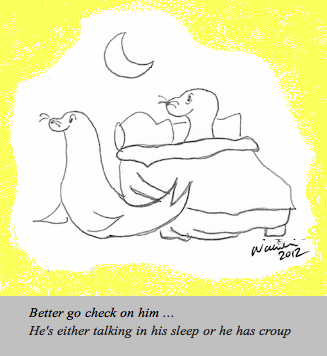
Croup is an often-suprising middle-of-the-night malady that produces a barky seal-like cough in children who seemed just fine at bedtime.
Any virus that causes cold-like symptoms of runny nose, cough, runny eyes, and sometimes fever, can also cause croup. Think parainfluenza, influenza (flu), RSV, adenovirus, rhinovirus, and now Covid-19. Any of these viruses can land in a child’s larynx, or voice box, and cause hoarseness, barky cough, and a weird gutteral sound on breathing inward, called “stridor.” Croup is the name we give the constellation of symptoms, not the name of the virus that causes it.
An adult with the same exact illness would sound hoarse, but would likely not have the strange barky cough or noisy breathing.
We have a great podcast on this subject, but for those who prefer to read medical advice, please read on.
Ways to help your child when they wake up with croup
Stay calm. Children are frightened when they wake up coughing and find it hard to take in a deep breath. Parents are often frightened too. Even if you are worried, exude calmness in order to help your child settle down.
Create a rain-forest like environment. Go into the bathroom, run a hot shower, and hunker down with a book to read to your child. The steam helps shrink the uncomfortable swelling in the voice box. Wait for about 15 minutes for the barky cough and the harsh gutteral breathing to subside.
You can also recreate a misty environment by cranking a humidifier in your child’s bedroom. To avoid the risk of burns, we recommend a cool mist humidifier, not a hot water vaporizer. The temperature of the mist does not matter; it is the mist itself that children with croup find soothing.
Go outside with your child. Wrap them in a blanket and head into the cool night air. This trick works as well as the steamy environment trick. Each winter we hear of our patients with croup who’s parents put them into the car to drive to the nearest Emergency Department, only to find that by the time they arrive, their child’s croupy cough and noisy breathing have resolved.
Treat any sore throat pain. Offer your child acetaminophen (brand name Tylenol) or ibuprofen (brand names Motrin, Advil) because easing the pain calms your child with croup and helps them to breathe easier.
When to take your child with croup to the emergency department
Most children with croup can be managed at home, but some need extra medical care. Head to the nearest emergency department or call 911 if your child has these symptoms:
- Turns blue or pale with coughing. Turning red is ok, but turning blue or pale means your child needs oxygen therapy.
- Is unable to swallow, drools uncontrollably, refuses to drink.
- Has labored breathing. See this link for example of what this can look like. If you see your child’s chest or belly moving in and out with every breath, you see your child’s ribs with breathing, you see their nostrils flare with every breath, or you hear that gutteral noise (stridor) with every breath inward even if your child is calm, then your child needs emergent medical care
- Shows a change in mental state. If your child fails to recognize you, seems too lethargic to respond appropriately to your care, or your “parent instinct” tells you something is wrong with your child’s thinking, they may need emergent care.
Strangely, a scary night of croup can be followed by a calmer day. Your markedly improved child may show merely some mild hoarseness or mild stuffy nose. Be aware that your child might have another night or two of croup symptoms, even after they barely cough during the day. So make sure your child and you take a nap in preparation for another possible rough night.
When to expect improvement
Most children with croup improve after two or three nights. Then, they develop more classic “cold” symptoms of runny nose and more “normal” sounding cough. Because Covid-19 virus is becoming a more common cause of croup, have your child tested so you know how long they need to stay home from school or daycare.
Talk to your child’s pediatrician if your child’s seal-like barky cough or cold symptoms last more than a week without improvement. Call sooner if your child seems to worsen or you have further concerns about your child. Know that some children are “Croupers” and tend to get the same croup symptoms with almost any cold virus. But take heart, even the croupers will be less croupy over time. It’s fairly uncommon to see a grade-school aged child with croup. Until then, you never know when you’ll hear a little seal in the middle of the night.
Julie Kardos, MD and Naline Lai, MD
©2022 Two Peds in a Pod®



